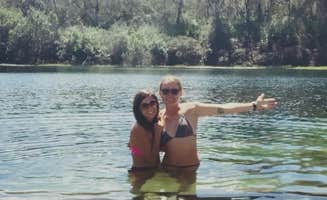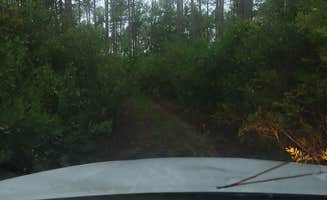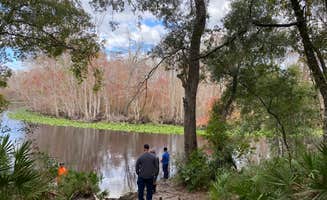Dispersed camping options near DeBary, Florida primarily center around the Ocala National Forest, where primitive sites exist without standard campground facilities. The forest covers over 387,000 acres of sand pine scrub, springs, and wetlands, with elevations rarely exceeding 100 feet above sea level. Winter temperatures typically remain mild, ranging from 50°F to 70°F, making it a popular season for backcountry camping.
What to do
Wildlife observation opportunities: At Trout Lake Primitive Sites, campers can experience Florida's diverse ecosystem. "Set of primitive spots near lake. Main road entry is packed dirt; smaller access road to sites is two-track about 1/4 mile through woods," notes reviewer Entropical Breeze E. Wildlife sightings often include deer, wild turkeys, and various bird species.
Paddling the waterways: Davenport Landing offers direct access to the Ocklawaha River. "If you are looking to catch and eat your meals, then this will certainly be an added bonus. The steps down the ravine to the river basin are somewhat steep, but for anyone towing a light-weight kayak or paddleboard, me thinks you could likely manage to bring your watercraft down here," explains Stuart K. The river system connects eventually to the St. Johns River.
Historical exploration: Several dispersed camping areas contain remnants of Florida's past. At Davenport Landing, "There's a 1.2 mile interpretive hiking trail called Davenport Landing Trail that will take to you to the former steamboat landing, which makes for a medium-grade hike with some interesting history," according to Stuart K. Visitors can also search for "a small gravesite from the Civil War that you can find along with middens along the Ocklawaha River hiding traces of the Timucuan Indians."
What campers like
Seclusion and quiet: Freak Creek Dispersed Camping attracts those seeking isolation. "It's super secluded and quiet. Depending when you stay there's at times people who show up to party and then leave," reports Adamm A. The remoteness tends to limit visitor traffic to those with appropriate vehicles and preparation.
Night sky viewing: Limited light pollution creates excellent stargazing conditions at primitive sites. At St. Johns River Dispersed Spot, one visitor observed that "the trees open up so you get a great view of the stars," making it ideal for astronomy enthusiasts.
Swimming opportunities: Natural water features provide relief from Florida heat. At Freak Creek Dispersed Camping, "There is a nice creek area where you can swim and or fish if you have the right equipment to get back there it can be fun," notes hilary G., though proper transportation remains essential to reach these swimming spots.
What you should know
Vehicle requirements crucial: Most dispersed sites demand appropriate transportation. At Blue Sink, "You may need ATV or creative backpacking to get there now. The Forestry Service recently chopped down trees and covered the easy access roads," warns Destiny R. Planning transportation logistics before arrival prevents becoming stranded.
No amenities available: Campers must be completely self-sufficient. Pack adequate water (minimum one gallon per person per day), food, shelter, and waste disposal supplies. Restroom facilities do not exist at these locations, requiring proper waste management practices.
Cell service limitations: Communication capabilities vary widely. At Trout Lake Primitive Sites, one camper reported "Poor cell service even with booster." Always inform someone of your camping location and expected return date before departing.
Security considerations: Research current conditions before visiting. At some sites like Lake Dorr, visitors have reported safety concerns. Always maintain awareness of surroundings and secure valuables appropriately.
Tips for camping with families
Choose sites with easier access: For family camping with children, Trout Lake Primitive Sites offers reasonable accessibility. "Very narrow trails but really easy access, you will leave with some new pinstripes," notes Joe P., indicating that while vehicle scratches are likely, the entrance requires less technical driving than other locations.
Pack insect protection: Florida's humid environment supports substantial mosquito and tick populations. Bring EPA-approved insect repellent, lightweight long clothing for evenings, and consider permethrin-treated gear for extended stays.
Prepare for weather fluctuations: Despite Florida's reputation for warmth, winter nights can drop into the 40s. Pack clothing layers, rain gear, and appropriate sleeping bags rated for potential temperature ranges during your visit dates.
Tips from RVers
Vehicle size restrictions: Most dispersed sites cannot accommodate standard RVs. At Davenport Landing, "Last 100 yards driving back in were very bumpy but no problem with our van. Not sure about a larger RV," reports David P. Small campervans or truck campers typically fare better than larger rigs.
Road condition awareness: Seasonal changes affect accessibility dramatically. After rain, sand becomes mud and ruts deepen. At Freak Creek, "The main road in has huge deep ruts, the other road has a water crossing that was over my bumper on my lifted Mojave," warns hilary G. Check recent weather patterns before attempting access.
Tight clearance challenges: Tree growth creates width constraints on forest roads. According to Entropical Breeze E. at Trout Lake, access requires navigating "very narrow tree clearance" where larger vehicles simply cannot pass without damage.




